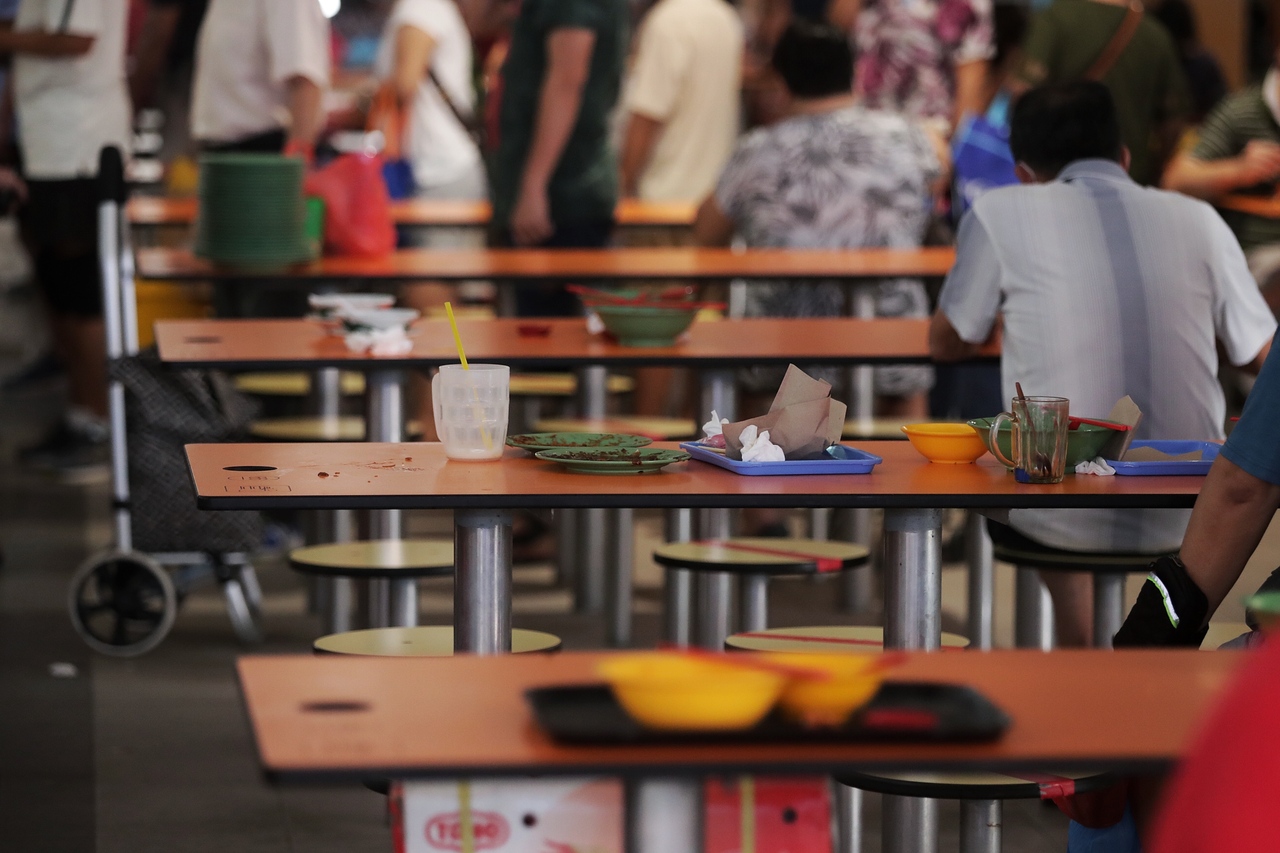More people dissatisfied with food outlets' cleanliness, but fewer than half return their trays: Survey
Sign up now: Get ST's newsletters delivered to your inbox

The decrease in satisfaction with the cleanliness of food outlets could be attributed to the heightened awareness of the importance of cleaning during the Covid-19 pandemic.
ST PHOTO: GIN TAY
Follow topic:
SINGAPORE - More people are dissatisfied with the cleanliness of food outlets, but it appears some patrons are not contributing enough to keep the places clean.
A survey conducted by the Singapore Management University (SMU) showed that fewer than half of the respondents had returned their trays more than half the time in coffee shops.
The decrease in satisfaction with the cleanliness of food outlets could be attributed to the heightened awareness of the importance of cleaning during the Covid-19 pandemic, the university said in a press release on Wednesday (Aug 18).
"With the spread of infectious diseases, public hygiene becomes even more important than just public cleanliness," said Professor Paulin Tay Straughan, dean of students and sociology professor at SMU.
She led the survey together with Dr Mathew Mathews, principal research fellow at the Institute of Policy Studies at the National University of Singapore.
"The pandemic made us realise that we can't always depend on a whole army of cleaners to act for us. It's timely for us to think about what we can do to make sure that the quality of our living spaces remain high," she added.
The survey, SMU's fourth Public Cleanliness Satisfaction Survey, was conducted from February to May this year. This was before it became mandatory from June 1 for diners to return their trays and clear their table of litter.
The survey of over 2,000 Singaporeans and permanent residents found a 3.7 per cent drop in satisfaction with the cleanliness of coffee shops, air-conditioned food courts, hawker centres and wet markets, compared with 2019.
Wet markets (84 per cent) and hawker centres (83 per cent) had the lowest proportion of respondents who were satisfied.
But the respondents' satisfaction with the cleanliness of coffee shops fell the most, dropping to 77 per cent this year from 86 per cent in the previous survey.
The survey also showed that of all the food outlets, people were least likely to return their trays at coffee shops - only 46 per cent returned their trays more than half the time there.
The top reason (71.2 per cent of respondents) was that cleaners clear their trays during or after their meal, before they leave the table.
Almost half the respondents cited the lack of visible signage on where to return their trays (45.2 per cent) and the tray return points not being in visible sight (44.6 per cent).
This year was also the first time the university's survey covered the cleanliness satisfaction in public toilets in various establishments.
Overall, 81.6 per cent of Singaporeans were satisfied with the cleanliness of these toilets.
Shopping mall toilets received the most thumbs up (96 per cent), while coffee shop toilets (61 per cent) and those in hawker centres (68 per cent) received the fewest.
The top three issues were: toilet seats or urinals were dirty or stained; the toilet floor in the common area was wet or stained; and the toilets had bad smells.
The survey results also indicated an increased reliance on cleaners to ensure cleanliness of the surroundings.

<p>A cleaner at Westgate Mall on October 2, 2020. </p>
PHOTO: ST
Nearly all respondents (94 per cent) expected that cleaners should clear rubbish bins throughout the day so that they would not overflow, an increase of 8 per cent from 2019.
The proportion of people who agreed that cleaners were not efficient in their work also increased by 11 per cent, to 46 per cent in 2021.
Prof Straughan said people can take ownership of their surroundings' cleanliness - such as cleaning up tables at hawker centres and reminding others of their role in keeping the community's living spaces clean.
But the survey showed that more respondents believed that it was the cleaners' responsibility to keep neighbourhoods clean, as they are paid to do so - from 32 per cent in 2019 to 48 per cent this year.
The proportion of people who agree that more money should be spent on cleaning services fell by 11 percentage points, from 71 per cent in 2019 to 60 per cent this year.
The majority also felt that the Government had a role to ensure public cleanliness, increasing by 15 percentage points from 58 per cent in 2019 to 73 per cent this year.


